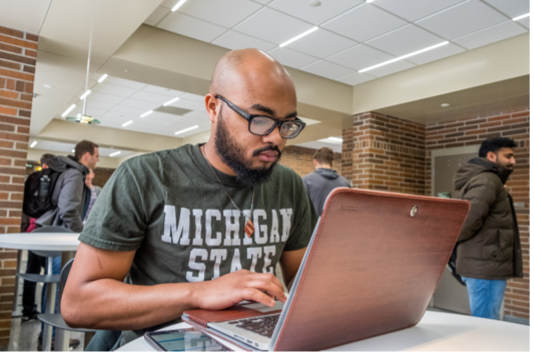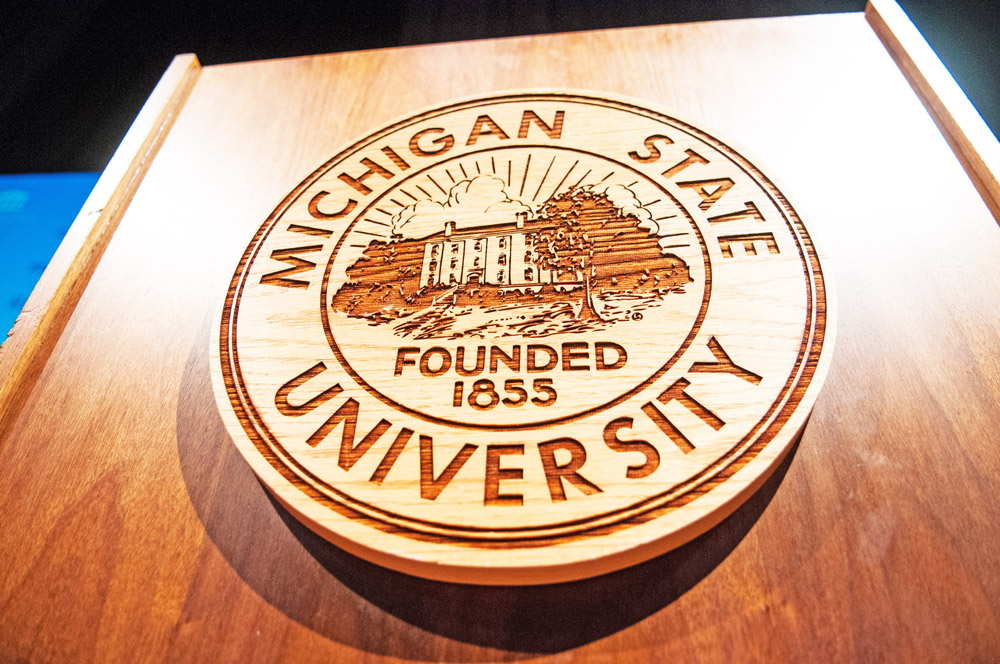MSU Information Technology supports many academic and administrative projects across the university. Our initiatives focus on improving the technology environment for Michigan State University in alignment with institutional strategic goals, including programs, systems, and enhancements that ensure success for students, educators, researchers and staff.
Identity and Access Management (IAM) Modernization Program
 In collaboration with multiple campus partners, this multi-year project will support over 600,000 Spartans with timely, accurate, and appropriate access to resources.
In collaboration with multiple campus partners, this multi-year project will support over 600,000 Spartans with timely, accurate, and appropriate access to resources.
The Program is designed to ensure every Spartan has seamless access to the right technology at every stage of their journey within the university. The scope includes selecting and implementing a modern IAM platform, alongside gathering, reviewing, and updating IAM business processes, policies, and standards. Additionally, the program aims to establish an IAM operational model, service catalog, and governance framework.
Currently, the program consists of 29 projects, with 5 completed and 8 actively underway. Operational efficiency will be improved through streamlined processes for account creation and password management, ensuring smoother user experiences. Additionally, the program will fulfill community responsibilities by providing robust support for identity and role management, ensuring that access privileges align with organizational needs and standards.
Campus Building Security Monitoring and Video
 This project builds upon MSU’s comprehensive security infrastructure across all MSU campus buildings by consolidating access control, intrusion monitoring, and video surveillance systems into a unified platform. This integration enhances campus safety, streamlines operations, and provides better management of physical security, ultimately improving police response times and situational awareness.
This project builds upon MSU’s comprehensive security infrastructure across all MSU campus buildings by consolidating access control, intrusion monitoring, and video surveillance systems into a unified platform. This integration enhances campus safety, streamlines operations, and provides better management of physical security, ultimately improving police response times and situational awareness.
Research Security Enclave
 MSU IT, in collaboration with the Office of Research and Innovation (ORI), is spearheading the establishment of a Research Security Enclave to uphold data security compliance in alignment with our strategic research goals.
MSU IT, in collaboration with the Office of Research and Innovation (ORI), is spearheading the establishment of a Research Security Enclave to uphold data security compliance in alignment with our strategic research goals.
The enclave’s primary objective is to ensure compliance with the rigorous standards outlined in NIST 800, providing researchers with a secure environment to conduct their work. Leveraging a cloud-based infrastructure hosted on Microsoft’s GCCH cloud environment, purpose-built for Department of Defense (DoD) and other compliance-driven applications, the enclave promises heightened security measures and regulatory adherence.
This endeavor ensures the necessary requirements are met for MSU participation in DoD-funded research projects. By proactively addressing data security concerns, the Regulated Research Enclave reinforces MSU’s commitment to facilitating cutting-edge research while safeguarding sensitive information.
Network Modernization Program
Building Infrastructure Program
 This initiative is dedicated to enhancing user experience by prioritizing the establishment or upgrade of IT infrastructure in new or renovated buildings. Through careful assessment and feedback from campus stakeholders, we will reduce network downtime, boost bandwidth, and enable proactive network management.
This initiative is dedicated to enhancing user experience by prioritizing the establishment or upgrade of IT infrastructure in new or renovated buildings. Through careful assessment and feedback from campus stakeholders, we will reduce network downtime, boost bandwidth, and enable proactive network management.
All new construction and renovation projects include an IT review component, ensuring seamless integration of building technology considerations necessary to support the needs of the MSU community. Students, faculty, staff, researchers, and guests will experience an environment that fosters better connectivity and productivity campus wide.
Marketing Technology Modernization Initiative
 This initiative is a strategic effort aimed at enhancing marketing and communications at MSU to create an engaging and more personalized branded digital experience for Spartans. It addresses the business need for improved university communications and marketing digital experiences by modernizing marketing technology platforms.
This initiative is a strategic effort aimed at enhancing marketing and communications at MSU to create an engaging and more personalized branded digital experience for Spartans. It addresses the business need for improved university communications and marketing digital experiences by modernizing marketing technology platforms.
This effort is part of a broader digital experience program, ensuring that Spartans benefit from cohesive and engaging interactions across various university touchpoints. By implementing several enterprise marketing technology platforms, the project will empower MSU departments to enhance their digital experiences and meaningfully connect with Spartans throughout their academic journey and beyond.
IT Stewardship and Sustainability
Enterprise Oracle Exadata Migration
 Aimed at enhancing MSU’s enterprise database operations, this project involves migrating primary enterprise application databases to a central environment by leveraging Oracle Exadata infrastructure. This migration allows us to be future-ready with sustainability in mind while optimizing database performance and operational efficiency.
Aimed at enhancing MSU’s enterprise database operations, this project involves migrating primary enterprise application databases to a central environment by leveraging Oracle Exadata infrastructure. This migration allows us to be future-ready with sustainability in mind while optimizing database performance and operational efficiency.
A centralized environment features a smaller server footprint compared to existing setups and ensures scalability to accommodate future growth. By migrating to Oracle Exadata, the project aims to provide the campus community with faster and more cost-effective high-performance database services and operations. Additionally, the centralized environment enhances data management and security while ensuring the continuity and availability of critical enterprise applications.
Establish Business Continuity Plans and Disaster Recovery Vision, Strategy, and Roadmap
 Efforts are underway to engage campus in business continuity planning and modernization of an IT disaster recovery roadmap to further ensure the availability and sustainability of mission-critical technology services to campus. This will improve overall security risk management and service resilience while enhancing restoration capabilities that improve both our recovery time and recovery point objectives. For the campus community, this translates to a reduction in service disruptions.
Efforts are underway to engage campus in business continuity planning and modernization of an IT disaster recovery roadmap to further ensure the availability and sustainability of mission-critical technology services to campus. This will improve overall security risk management and service resilience while enhancing restoration capabilities that improve both our recovery time and recovery point objectives. For the campus community, this translates to a reduction in service disruptions.




